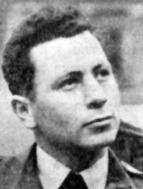 The son of Leon and Chava, Wilfred Canter was born in Kiev, Ukraine, on 7th February 1921. When he was five-years-old his parents emigrated to Canada, and settled in Toronto, where he completed elementary and technical high schools.
The son of Leon and Chava, Wilfred Canter was born in Kiev, Ukraine, on 7th February 1921. When he was five-years-old his parents emigrated to Canada, and settled in Toronto, where he completed elementary and technical high schools.
At the age of 18 he was mobilized into the Royal Canadian Air Force, and after a year’s training was sent to England. There he qualified as a flying officer in the fight against Germany. In April 1941 his bomber was shot down over Stuttgart, and he was the sole survivor of his crew. On parachuting into France, both his legs were broken. He was unable to move and lay hidden for nine days. A local family found him, and mercifully brought him food to his hiding place.
The underground helped him to escape from occupied France to Switzerland, and somehow he reached Gibraltar, and via England he flew back to Canada. A month later he returned to his flying duties in England. As a bomber pilot over Germany, his plane was hit again, but the crew succeeded in flying back to England, and he survived.
In the month of April 1942, his third aircraft was hit and he and some of the crew managed to parachute to safety. However, they were taken prisoner by the Germans in the Dusseldorf area. He was interrogated by the Gestapo at great length, but his self-discipline helped him to survive. He later told his mother, “Till this day I believe that allowed me to stay alive,” but gave her no details.
He was also one of the organizers of the famous “Great Escape” from a German prisoner-of-war camp where 50 allied airmen were recaptured and executed by the SS. In this escapade, he was one of those who did not succeed in getting through the tunnel under the camp fence, and thus was saved from the massacre.
On the eve of the invasion of Germany by the Allies, the prisoners-of-war were force-marched eastwards. During this march, he again escaped and successfully reached the advancing English forces and sent back to England. There he was given an audience with King George IV at Buckingham Palace, and decorated with the Distinguished Service Order (DSO).
In 1945 Wilfred Canter was sent back to his home in Canada, but after all he had been through and seen, he could not find peace of mind. Only when Israel’s War of Independence broke out was he able to emerge from his depression; he discovered what he wanted to do with his life, and he was amongst the first of the Canadian pilots to volunteer for Israel.
Here he participated in many flying missions, surviving all of them until 25th October 1948. Soon after a night take-off from Ekron on a supply run to Sdom, his Dakota C-47’s right engine begin to overheat. The engine exploded within sight of the airfield, breaking off the wing and sending the plane spiraling into the ground near Kfar Yesodot. Killed with him were two Canadians, co-pilot Fred Stevenson and navigator Willie Fisher. British radio operator Leon Lightman, and Army Liaison Officer Michael Wimers, known as “King of the Negev,” were also killed.
Wilfred Canter was buried on 26th October 1948 at the Rehovot cemetery.
On 29th September 1948, on orders from the Chief of Staff, he was posthumously promoted to Flight Commander.
Source: Translated from the Yizkor website by Joe Woolf.

